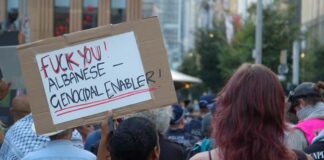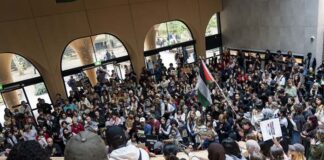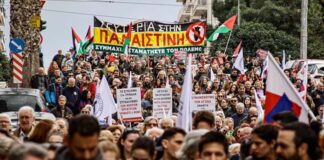The NSW Greens and Marrickville council’s support for the Boycott, Divestment and Sanctions (BDS) campaign against Israel has faced a vicious right-wing onslaught led by the Murdoch press. During the NSW state election The Australian targeted Fiona Byrne, standing as the Marrickville Greens candidate, over the council’s support for BDS.
Marrickville council was intimidated into overturing its support for BDS. Labor councillors, but also two Greens councillors, who had all backed a motion supporting BDS in December, reversed their support for it at a meeting in mid-April. Three Greens councillors, including mayor Fiona Byrne, as well as one independent, resisted the pressure and voted to maintain in principle support for BDS. The saga has revealed what The Australian’s declared mission to “destroy” The Greens means—and also shows that The Greens will need much more than an electoral strategy to fight them off.
A defensible policy
The Australian set out to paint support for BDS as “radical” and “extremist”. Yet is has been supported by local councils in Spain, Britain, the Netherlands and peak union bodies in South Africa, Scotland, Ireland and the UK. Anti-apartheid activists Nelson Mandela and Desmond Tutu support it.
Israel has occupied Palestinian territories in defiance of the UN Security Council for over 40 years, expanding illegal settlements on confiscated land. The apartheid wall it is building in the West Bank, that cuts off tens of thousands of Palestinians from their lands and crops, was condemned by the International Court of Justice as “illegal” in 2004—the spark for the BDS campaign. The 2009 war on Gaza, the ongoing blockade of the strip, and the attack on an humanitarian aid flotilla last year has all revealed Israel’s disregard for Palestinian lives. Israel is a militarised colonising power that lashes out in defiance of overwhelming international condemnation.
The NSW Greens had an opportunity to stand up to the right-wing backlash against them, mobilise supporters of Palestinian rights and score a serious victory for the left.
Greens’ strategy
Instead, when first attacked over BDS, Fiona Byrne backtracked under the pressure, denying she had pushed for it on council and saying she wouldn’t raise it in state parliament if elected. This made it look like there was a problem with the policy and it gave Labor more confidence to go after her. Despite Marrickville Labor MP Carmel Tebbutt’s claims to be progressive, she and local federal MP Anthony Albanese disgracefully attacked Byrne and the policy.
Following the election, NSW Greens Senator-elect Lee Rhiannon came in for particular abuse for rightly saying that The Greens should have defended the policy more strongly during the election campaign and built up community support. After all, support for BDS was NSW Greens policy, adopted in December.
A chorus of figures on the right of The Greens aided the witch-hunt. Federal Greens leader Bob Brown, Victorian Greens leader Greg Barber and NSW Greens upper house MP Cate Faehrmann all criticised the policy. In the face of criticism from Bob Brown, the NSW Greens shied away from publicly opposing the federal leader.
This uncertainty over the policy gave little confidence to other councillors and the rest of the left to stand up to the onslaught, and paved the way for the council overturning BDS.
Things did not have to be this way. If the NSW Greens had been willing to stand by BDS from the outset, they could have drawn on the significant base of support for Palestinian rights. Over 200 people, overwhelmingly Palestinian supporters, spontaneously turned up to the Marrickville council meeting where the move was made to overturn BDS. Unions including the CFMEU, ASU, MUA and others have previously supported it. The Greens could have made common cause with other supporters of Palestinian rights like the Sydney Peace Foundation, which endured a similar right-wing backlash in 2003 over its decision to award Palestinian Hanan Ashrawi the Sydney Peace Prize. The left, too, could have done more to defend The Greens and BDS from the onslaught—but that was difficult to muster in a climate where The Greens position was unclear.
The fierce campaign by the right shows that The Greens are making a political impact. By defending themselves, The Greens could have turned a crisis into an opportunity.
The saga highlights the choices facing The Greens as a party. Their focus on parliament creates pressure to accommodate to more conservative parts of the electorate in order to win votes. That often means accepting existing public opinion (or lies spun in the mass media) instead of fighting to change them. But that nearly always results in no challenge to the status quo. There is no doubt that many Greens members and MPs seriously want to change the world. But to do so they need to organise and lead social movements that put the case for social change. It would be a tragedy if the powerful in this country succeed in dragging The Greens to the right.
By James Supple





